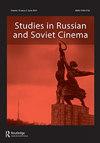Shaping the genealogy of the Soviet intelligentsia in two film adaptations of the 1960s
IF 0.4
0 FILM, RADIO, TELEVISION
引用次数: 2
Abstract
ABSTRACT This article traces the role of the intelligentsia as represented in the cinema of the Thaw through two Soviet films from 1960: The Blind Musician by Tat’iana Lukashevich and The Northern Story by Evgenii Andrikanis. Both films were adaptations of literary texts: a short novel by Vladimir Korolenko originally published in 1898, and a novella by Konstantin Paustovskii published in 1938 respectively. The protagonists of both films belong to diverse generations of the Russian intelligentsia. Based on an analysis of the films and archival research of the scripts, this article demonstrates that these two films covertly revisit the historical role of Russia’s intelligentsia, which they present as an independent force of historical progress, albeit inspired by the ‘common people’. This new image of the intelligentsia was created by film-makers who had worked in cinema since the 1920s and early 30s, and who remembered Stalin’s humiliation of intellectuals. They opposed to the experience of the late 1940s and its anti-cosmopolitan campaigns the heroic myth of the revolutionary intelligentsia. This myth represented the intelligentsia as Russia’s liberators and was traced back to the pre-Revolutionary period. Both films combine the aesthetics of Stalinist cinema and local experiments that tended to destabilise it.在20世纪60年代的两部改编电影中塑造苏联知识分子的谱系
摘要本文通过塔蒂亚娜·卢卡舍维奇的《盲人音乐家》和叶夫根尼·安德里卡尼斯的《北方故事》这两部1960年的苏联电影,追溯了知识分子在泰国电影中的角色。这两部电影都改编自文学文本:弗拉基米尔·科罗连科的短篇小说最初于1898年出版,康斯坦丁·波斯托夫斯基的中篇小说分别于1938年出版。这两部电影的主人公都属于不同世代的俄罗斯知识分子。本文通过对电影的分析和对剧本的档案研究,表明这两部电影暗中重新审视了俄罗斯知识分子的历史角色,他们将其作为历史进步的独立力量呈现出来,尽管受到了“普通人”的启发。这种新的知识分子形象是由自20世纪20年代和30年代初以来一直在电影院工作的电影制作人创造的,他们还记得斯大林对知识分子的羞辱。他们反对20世纪40年代末的经历及其反世界运动——革命知识分子的英雄神话。这个神话代表了知识界作为俄罗斯的解放者,可以追溯到革命前时期。这两部电影都融合了斯大林主义电影的美学和当地的实验,这些实验往往会破坏电影的稳定。
本文章由计算机程序翻译,如有差异,请以英文原文为准。
求助全文
约1分钟内获得全文
求助全文

 求助内容:
求助内容: 应助结果提醒方式:
应助结果提醒方式:


